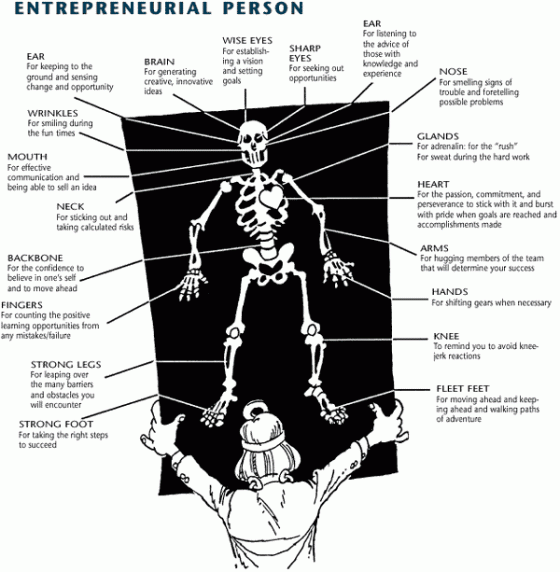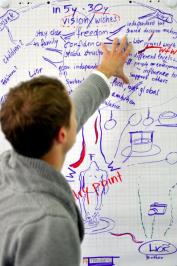Executive Summary
The water and sanitation sector offers many opportunities for interested professionals and service providers. From simple measures to supply potable water in tankers or bottles or the construction of wells and latrines, up to the design and installation of complex wastewater treatment plants or the performance of water footprint studies, the solutions are multiple to contribute to the improvement of the water management and sanitation supply worldwide. Given the complexity of the sector, sometimes dominated by a few multinational companies and sometimes neglected by the authorities, it is important for you as entrepreneur to understand yourself, the reasons why are you embarking in this challenging project and what you have to offer to make your start-up a successful and sustainable enterprise.
The internal analysis of an entrepreneur is one of the most important steps in the entrepreneurial process. You should start by asking yourself: am I an entrepreneur? But, do you know what an entrepreneur is? Entrepreneurs are those individuals with the motivation, drive and ability to take the risk to start a new business in the face of uncertainty, assembling the necessary resources and ensuring sustainable profit and growth (adapted from Zimmerer and Scarborough, 2011).

Cewas Participant during the self-evaluation. Source: cewas: Start up your business! (2012)
Anyone can become an entrepreneur, and the tendency to create one’s own business has grown exponentially in the last decades. Particularly in the retail and service and IT sector, it is noticeable how young entrepreneurs are engaging in new business ventures taking advantage of the latest developments in telecommunications. According to Zimmerer and Scarborough (2011), entrepreneurs are characterised by:
- Desire for responsibility
- Preference for moderate risk, which means that entrepreneurs are risk eliminators
- Confidence in their ability to succeed
- Desire for immediate feedback
- High level of energy
- Future orientation
- Skilled at organising
- Value achievement over money

The Entrepreneurial Person. Source: CFEE (2012)

cewas participant during his internal analysis. Source: cewas: Start your own business! (2012)
The benefits of entrepreneurship are manifold: it gives you the opportunity to decide your own destiny, develop your capacities to their full potential and reap impressive profits, or at least more that the salary you would get by working for someone. However, entrepreneurs in the water and sanitation sector tend to be less worried about the profits they might make, and more concerned about the social and ecological impact of their initiatives. SSWM entrepreneurs are dreamers who want to make a difference and contribute to society. They all have something in common, and that is: they love what they do and they have fun doing it!
Passion is important! You need to love to be able to face all the problems that arise with entrepreneurship: uncertainty of income, risk of losing your investment, long hours and hard work (including nights and weekends) and the possibility of not succeeding. So, are you ready to accept the challenge?
The Entrepreneurial Person
Essentials of entrepreneurship and Small Business Management
12 Essential Characteristics of an Entrepreneur
This article presents the five levels of entrepreneurial development (self-employed mind-set, the managerial perspective, the attitude of owner/leader, the entrepreneurial investor and the true entrepreneur), giving as well 12 characteristics essential for entrepreneurs.
ACTIONCOACH (n.y): 12 Essential Characteristics of an Entrepreneur. Las Vegas: ActionCoach URL [Accessed: 09.10.2012]The Anatomy of an Entrepreneur
This paper explores company founders' opinions and observations about their own trajectory and what influenced the success or failure of their businesses. It intends to support entrepreneurs and create societal, political and economic conditions that can foster entrepreneurship. The research is based on a survey of 549 companies of various companies.
WADHWA, V. AGGARWAL, R. HOLLY, K. SALKEVER, A. (2009): The Anatomy of an Entrepreneur. Making of a Successful Entrepreneur. Kansas City: Kauffman, the Foundation of Entrepreneurship URL [Accessed: 22.08.2012]Tapping the Market - Opportunities for Domestic Investments in Water for the Poor
To improve access to safe water, particularly by the poor, developing country governments and the international development community are looking to the domestic private sector to play an expanded role. This report examines piped water schemes in rural areas of Bangladesh, Benin, and Cambodia and concludes that in the three study countries, un-served people could increasingly rely on service provision through the domestic private sector as the potential market the domestic private sector could be serving is very large.
THE WORLD BANK ; WSP ; IFC (2013): Tapping the Market - Opportunities for Domestic Investments in Water for the Poor. (= Conference Edition ). Washington: The World Bank, Water and Sanitation Program (wsp), International Finance Corporation (IFC) URL [Accessed: 05.09.2013]Tapping the Market - Opportunities for Domestic Investments in Sanitation for the Poor
To improve access to sanitation, particularly by the poor, developing country governments and the international development community are looking to the domestic private sector to play an expanded role. This report examines private sector provision of on-site sanitation services in Bangladesh, Indonesia, Peru, and Tanzania and concludes that in the study countries, un-served people could increasingly rely on service provision through the domestic private sector as the potential market the domestic private sector could be serving is very large.
THE WORLD BANK ; WSP ; IFC (2013): Tapping the Market - Opportunities for Domestic Investments in Sanitation for the Poor. (= Conference Edition ). Washington: The World Bank, Water and Sanitation Program (wsp), International Finance Corporation (IFC) URL [Accessed: 05.09.2013]Achieving Sustainability. Guiding Entrepreneurs to Independence
Supporting entrepreneurs to start up viable sanitation businesses can be relatively straightforward. However, challenges typically arise in the transition from donor-supported start-up to true independence. This note looks at the obstacles that need to be overcome in growing start-up businesses to become fully self-sustaining, and discusses how progress can be made.
COWLING, R. (2013): Achieving Sustainability. Guiding Entrepreneurs to Independence. (= Practice Note , 12 ). London: Water and Sanitation for the Urban Poor (WSUP) URL [Accessed: 01.10.2013]A Decade of the Total Sanitation Campaign (TSC), India: Rapid Assessment of Processes and Outcomes
This report analyses primary and secondary data on the TSC to arrive at an understanding of the processes, outputs, and outcomes at a national level and across the states, which are compared to program inputs. The analysis is useful in tracking the efficiency of the states in terms of time taken to achieve total sanitation and the financial expenditure put forward to achieve outcomes.
WSP (2011): A Decade of the Total Sanitation Campaign (TSC), India: Rapid Assessment of Processes and Outcomes. Washington, D.C.: Water and Sanitation Program (WSP) URL [Accessed: 06.02.2012]http://www.sba.gov
This is an online resource platform developed by U.S. Small Business Administration. In this section you can find a list of articles to learn more about what it takes to start a business.
http://www.mvp.cfee.org
Mentors, Ventures and Plans is a web resource created by the Canadian Foundation for Economic Education presenting a great collection of information regarding entrepreneurship and entrepreneurs. This particular section makes a throughout analysis of the characteristics of entrepreneurs.

